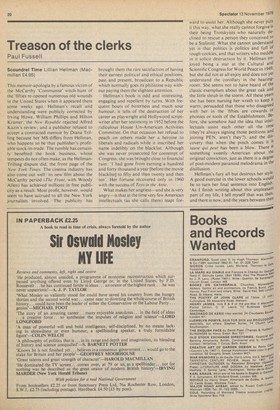Treason of the clerks
Paul Fussell
Scoundrel Time Lillian Hellman (Macmillan £4.95) This memoir-apologia by a famous victim of the McCarthy 'Communist' witch-hunt of the 'fifties re-opened numerous old wounds in the United States when it appeared there some weeks ago. Hellman's recall and understanding were publicly corrected by Irving Howe, William Phillips and Hilton Kramer; the New Republic rejected Alfred Kazin's review; and a publisher refused to accept a contracted memoir by Diana Trilling because her MS differs from Hellman. who happens to he that publisher's profitable stock-in-trade. The rumble has certainly benefited the boOk business, whose tempests do not often make, as the HellmanTrilling dispute did, the front page of the New York Times. The cinema industry has also come out well : its new film about the McCarthy period (The Front. with Woody Allen) has achieved millions in free publicity as a result. Most profit, however, would seem to have accrued to all the New York journalists involved. The publicity has brought them the rare satisfaction of having their earnest political and ethical positions, past and present, broadcast to a Republic which normally goes its philistine way without paying them the slightest attention.
Hellman's book is odd and interesting. engaging and repellent by turns. With frequent bouts of bitterness and much sour humour, it tells of the destruction of her career as playwright and Hollywood scriptwriter after her testimony in 1952 before the ,ridiculous House Un-American Activities Committee. On that occasion her refusal to peach on others made her a heroine to liberals and radicals while it inscribed her name indelibly on the blacklist. Although she was never prosecuted for contempt of Congress, she was brought close to financial ruin : 'I had gone from earning a hundred and forty thousand a year [before the movie blacklist] to fifty and then twenty and then ten'. Her fortune recovered only in 1960 with the success of Toys in the Attic.
What makes her angriest--and she is very angry--is that at the time very few American intellectuals (as she calls them) leapt for
ward to assist her. Although she never puts it this way, what she really cannot forgive is their being Trotskyists who naturally declined to rescue a person they conceived to be a Stalinist. What she cannot understand yet is that politics is politics and full of tough cookies, and that writers who meddle in it solicit destruction by it. Hellman enjoyed being a star at the Cultural and Scientific Congress for World Peace in 1949, but she did not at all enjoy and does not yet understand the corollary in the hearing room. She seems not to have heard of the classic exemplum about the great oak and the little shrub in the storm. All these years she has been nursing her wrath to keep It warm, persuaded that those who disagreed with her in the 'fifties are cowards or phonies or tools of the Establishment. Be' fore, she somehow had the idea that intellectuals assist each other all the time (they're always signing those Petitions and joining PEN, aren't they?), and the discovery that when the pinch comes it Is suave qui peat has been a blow. There Is something sweetly American about the original conviction, just as there is a degree of post-modern paranoid melodrama in the disillusion.
Hellman's fury all but destroys her style. A good exercise in the lower schools would be to turn her final sentence into English: 'As I finish writing about this unpleasant part of my life. I tell myself that was then, and there is now, and the years between then


































 Previous page
Previous page